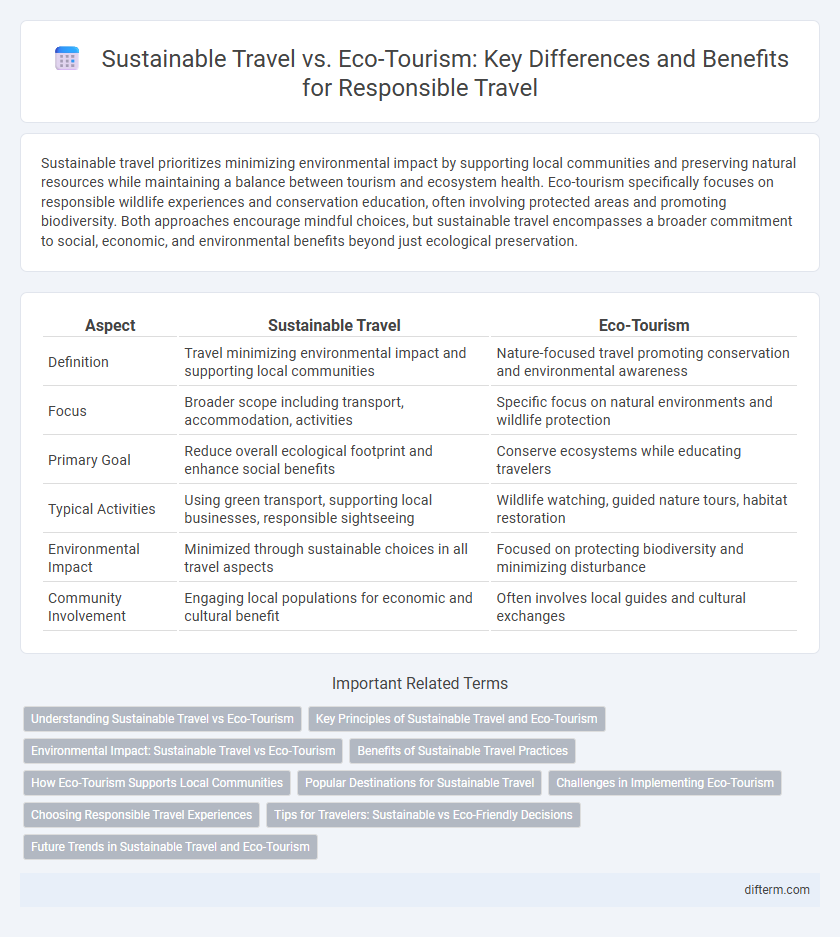Sustainable travel prioritizes minimizing environmental impact by supporting local communities and preserving natural resources while maintaining a balance between tourism and ecosystem health. Eco-tourism specifically focuses on responsible wildlife experiences and conservation education, often involving protected areas and promoting biodiversity. Both approaches encourage mindful choices, but sustainable travel encompasses a broader commitment to social, economic, and environmental benefits beyond just ecological preservation.
Table of Comparison
| Aspect | Sustainable Travel | Eco-Tourism |
|---|---|---|
| Definition | Travel minimizing environmental impact and supporting local communities | Nature-focused travel promoting conservation and environmental awareness |
| Focus | Broader scope including transport, accommodation, activities | Specific focus on natural environments and wildlife protection |
| Primary Goal | Reduce overall ecological footprint and enhance social benefits | Conserve ecosystems while educating travelers |
| Typical Activities | Using green transport, supporting local businesses, responsible sightseeing | Wildlife watching, guided nature tours, habitat restoration |
| Environmental Impact | Minimized through sustainable choices in all travel aspects | Focused on protecting biodiversity and minimizing disturbance |
| Community Involvement | Engaging local populations for economic and cultural benefit | Often involves local guides and cultural exchanges |
Understanding Sustainable Travel vs Eco-Tourism
Sustainable travel emphasizes minimizing environmental impact while supporting local communities and economies through responsible tourism practices. Eco-tourism specifically targets low-impact, nature-based experiences that promote conservation and environmental education. Both concepts prioritize stewardship but differ in scope, with sustainable travel encompassing broader social and economic sustainability goals beyond ecological preservation.
Key Principles of Sustainable Travel and Eco-Tourism
Sustainable travel emphasizes minimizing environmental impact, supporting local economies, and preserving cultural heritage while promoting responsible behavior among tourists and service providers. Eco-tourism focuses on conservation, education, and fostering respect for natural habitats through low-impact activities that benefit both wildlife and indigenous communities. Core principles include reducing carbon footprints, promoting biodiversity, ensuring community involvement, and enhancing visitor awareness to create a positive environmental and social legacy.
Environmental Impact: Sustainable Travel vs Eco-Tourism
Sustainable travel emphasizes minimizing environmental impact through responsible transportation choices, energy-efficient accommodations, and waste reduction practices. Eco-tourism specifically focuses on preserving natural habitats and supporting conservation efforts by promoting low-impact activities and educating travelers about local ecosystems. Both approaches aim to protect biodiversity and reduce carbon footprints, but eco-tourism often involves direct engagement with fragile environments to foster environmental stewardship.
Benefits of Sustainable Travel Practices
Sustainable travel practices significantly reduce environmental impact by minimizing carbon footprints and preserving natural resources. These practices promote responsible consumption and support local economies, enhancing cultural preservation and community well-being. Travelers engaging in sustainable travel contribute to long-term ecological balance and ensure destinations remain vibrant for future generations.
How Eco-Tourism Supports Local Communities
Eco-tourism supports local communities by promoting responsible travel that prioritizes conservation and cultural preservation, ensuring economic benefits directly reach indigenous populations. By encouraging small-scale, locally operated accommodations and guided tours, eco-tourism creates jobs and fosters environmental stewardship. This approach not only sustains natural habitats but also empowers communities to maintain their cultural identity and improve living standards.
Popular Destinations for Sustainable Travel
Costa Rica, New Zealand, and Bhutan are leading popular destinations for sustainable travel, known for their commitment to environmental preservation and community involvement. These locations offer eco-friendly accommodations, wildlife conservation initiatives, and cultural heritage experiences that minimize environmental impact. Travelers seeking responsible tourism can explore national parks, engage with local communities, and support sustainable practices in these top eco-conscious destinations.
Challenges in Implementing Eco-Tourism
Implementing eco-tourism faces challenges such as ensuring local community involvement, managing environmental impact, and maintaining financial viability. Limited infrastructure and lack of awareness among travelers further complicate effective eco-tourism practices. Balancing conservation efforts with tourist demand requires continuous education and strong policy enforcement.
Choosing Responsible Travel Experiences
Choosing responsible travel experiences involves prioritizing destinations and activities that minimize environmental impact while supporting local communities. Sustainable travel encompasses broad practices like reducing carbon footprints and conserving resources, whereas eco-tourism specifically targets nature-focused trips that educate travelers and promote conservation efforts. Opting for certified eco-friendly accommodations and engaging with local cultures ensures meaningful contributions to preservation and socio-economic development.
Tips for Travelers: Sustainable vs Eco-Friendly Decisions
Choosing sustainable travel means prioritizing low-impact transportation options like trains or buses to reduce carbon emissions. Eco-tourism emphasizes supporting conservation efforts by visiting protected areas and engaging with local communities to promote environmental awareness. Travelers can make eco-friendly decisions by selecting accommodations with green certifications and minimizing single-use plastics during their trips.
Future Trends in Sustainable Travel and Eco-Tourism
Future trends in sustainable travel and eco-tourism emphasize renewable energy integration, low-impact transportation, and advanced waste reduction systems in accommodations. Emerging technologies like AI-driven resource management and eco-friendly infrastructure designs are set to enhance conservation efforts and minimize carbon footprints. Growing consumer demand for authentic cultural experiences combined with environmental responsibility drives innovation in sustainable tourism practices worldwide.
sustainable travel vs eco-tourism Infographic

 difterm.com
difterm.com